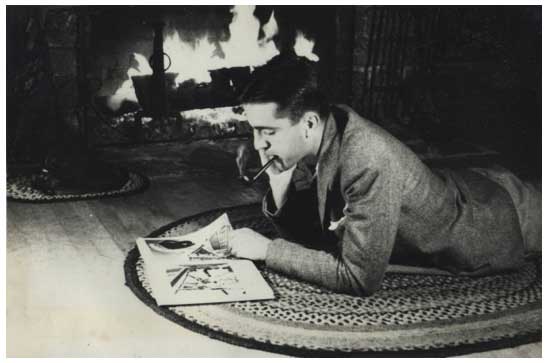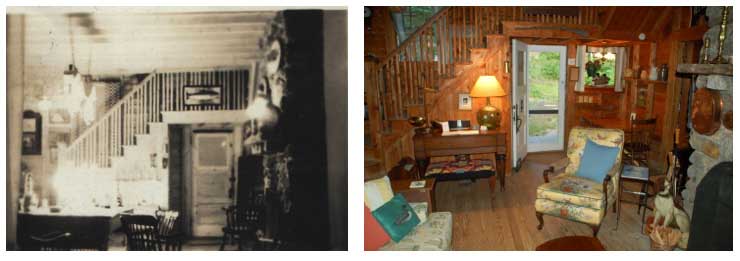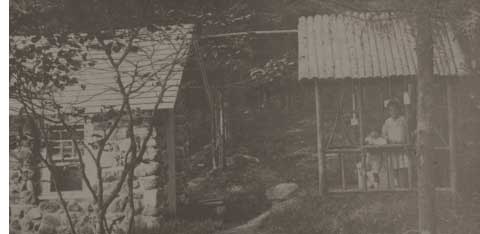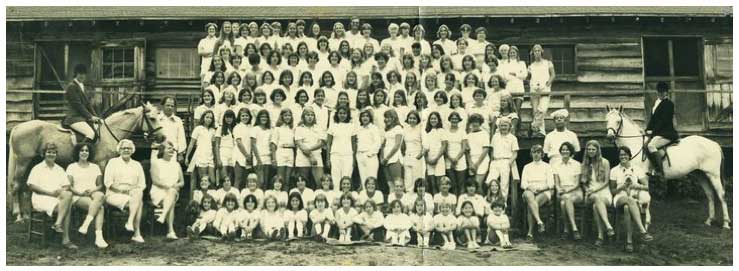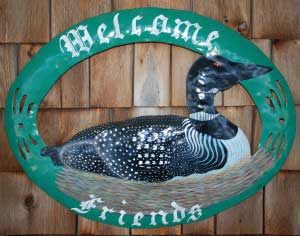Kill Kare and Camp Four Winds (BUS.15)
Photos and text about Kill Kare and Camp Four Winds.
Kill Kare Cottage and Camp Four Winds
The following histories of the summer cottage Kill Kare and of Camp Four Winds were shared with the library by Catherine McNeal Larson, the daughter of the camp founder, Grace Hooper Smith McNeal and granddaughter of the cottage builders/owners Wilbur and Catherine Smith.
Kill Kare History
Generations of our family and friends have been privileged and blessed to enjoy this venerable old house since 1917 when it was first built as a rustic fishing cabin. 1917 – Woodrow Wilson was in the White House, John F. Kennedy was born, Tsarist Russia was being overturned by Vladimir Lenin and the Bolsheviks during the Russian Revolution, “The Great War” was being fought in Europe and the average price for: a new car was $375.00, a gallon of milk was $0.44, a loaf of bread was $0.09 and a stamp was $0.02. Kill Kare has stood witness to over nine decades of history. If only the walls could talk.
My grandparents, Wilbur and Catherine Smith from Baltimore, Maryland, first discovered the allure of the Maine coast in the early 1900’s when they started to visit – along with several families from Baltimore, Washington, D.C., Philadelphia and Boston – in the Haven Colony in nearby Brooklin, Maine (alluded to in Anne Rivers Siddons’ 1992 book, Colony). In 1915, the Smiths decided to build a summer home on the shores of the Eggemoggin Reach (part of the Penobscot Bay) that they named “Bon Air” thereby escaping the pre-air conditioning days of sweltering Baltimore summers. It was here that their daughter, my mother, Grace Hooper Smith McNeal, and her brother, Will, began their lifelong love affair with Maine. (You can click on the pictures to enlarge them.)
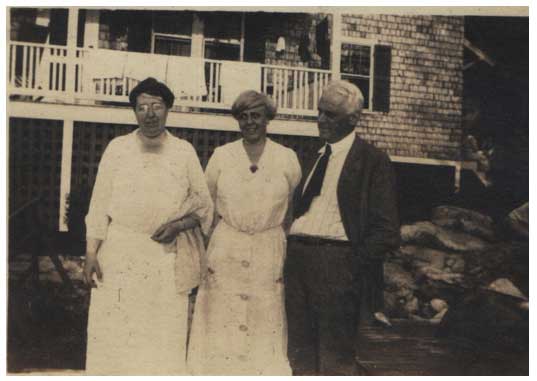
My grandparents, Catherine and Wilbur Smith, flanking an unidentified guest at Kill Kare circa 1920′s.
My grandfather was an avid fisherman (see the fish above the mantle – some of which he caught and all of which came from the pond). He preferred the serenity and tranquility of a lake to the salt waters of the Penobscot Bay. So, in 1917, he and my grandmother found a spot on Walker Pond where they built Kill Kare Kamp – so named because you come here to “kill your cares”. My grandfather rowed out to the middle of the lake, identified two large rocks and asked to have the house built directly on them. He wanted to feel as though he was on shipboard when he sat on the expansive wrap-around porch he envisioned. Because of current strict environmental laws, Kill Kare is a house that could not be built today.
Life at Kill Kare was much more rustic than at Bon Air. There was no electricity. Candles and kerosene lamps were the only source of light. There were no closets or bureaus so wooden shelves were nailed into the walls for clothes. The beds were not the warm wooden ones currently in the bedrooms, but noisy and rickety iron bedsteads. However, the family loved it and would pack the car with all of their belongings and move from Bon Air every couple of weeks to enjoy life on the lake. After several years of this summertime nomadic life style (which the family agreed was kind of silly) it was decided to settle permanently on Walker Pond and Bon Air was sold to good friends in the Haven Colony.
Catherine Smith loved antiques and would scour the countryside – not only in shops, but also in barns and attics for nice pieces that she bought and put in Kill Kare. She had quite an eye and once saw a table that was being occupied by a number of chickens in a barn. She had to shoo them away to get a good look at it. My grandmother asked the farmer’s wife if she could have the table if she bought another one for the barn. A deal was struck. Both ladies were happy. This was not an uncommon way for her to furnish the house. As she purchased beds and dressers, the iron bedsteads came out and the wooden shelves came down to accommodate the lovely things my grandmother would find in her antiquing forays.
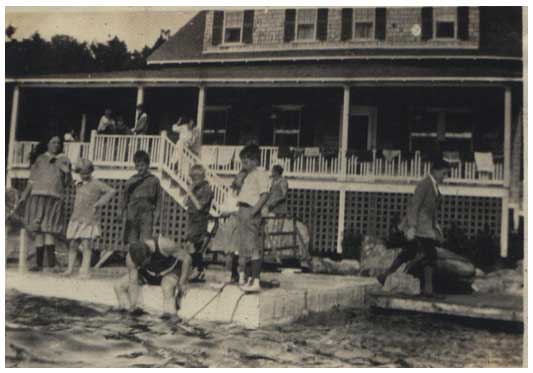
Kill Kare was party central when my mother and her brother were growing up there. My grandmother was a most gracious hostess and friends remembered her lovely gatherings decades later. In this picture, my mother is to the extreme left in the bloomers. My uncle, Will, is two over to her left.
Kill Kare was built with several bedrooms attesting to the number of friends the family had. When you have a home on the coast of Maine, there is never a shortage of visitors. My mother, Grace (whom her father referred to as the “Host to the Coast”) and her brother, Will, had a large group of friends “from away”. They gathered every summer in Down East Maine to swim, sail, canoe, have island picnics, churn homemade ice cream, sing around a campfire, hike, go on scavenger hunts, enjoy incredible sunsets and Northern Lights, star gaze at constellations so bright they seemed to be almost within reach, watch loons, eagles, deer, moose and myriad other wildlife and, of course, to fish.
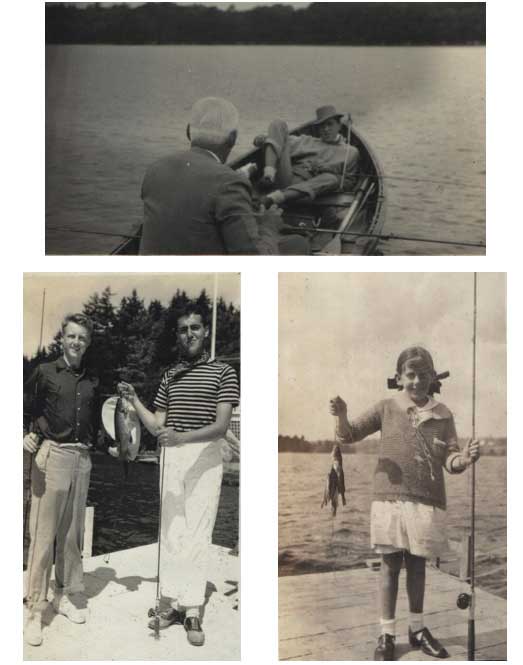
My grandfather, my uncle (in the striped shirt) and my mother (with the giant bow in her hair) were all adept at catching dinner.
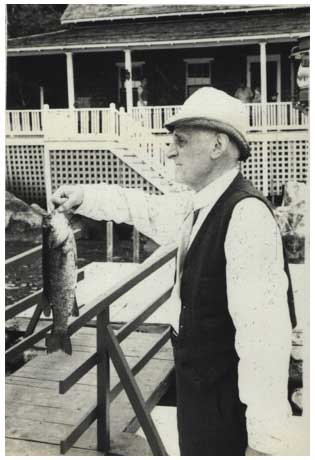
Friday nights at Kill Kare were cornbread and fish night. My grandfather would catch the fish and the cook would fry it up in a cast iron skillet.
Having had such idyllic childhood summers in Maine, it seemed only natural for my mother to start a girls’ summer camp – Four Winds – on the adjacent old farm that her parents purchased in 1922. Part of this property included a wonderful natural sandy beach so water sports were a popular and integral part of the camp program. (If you paddle south from Kill Kare – taking a left from our dock – you’ll see the sand beach where Four Winds was about 1/4 mile down the shoreline.) Four Winds’ proximity to the Penobscot Bay (the end of Walker Pond is a scant 1/4 mile from the salt water) afforded the opportunity for campers to experience and enjoy both bodies of water.
My mother, my father (an Army officer having just returned from the war in the Pacific) and their firstborn, Grace Hooper (my older sister who was three at the time) spent three snowy months in the spring of 1946 in a rustic little cabin – Ledge Lodge – on the edge of Walker Pond building what would become Camp Four Winds.

Camp Four Winds – 1946-2002 Four Winds was built on property my grandparents bought in 1922, five years after they started enjoying summers at Kill Kare. Built during the war when provisions were in short supply, my mother would economize by buying buildings and having them moved on the ice. The original camp kitchen had been a garage in an earlier life. In the picture above, you can see the main lodge, Trade Winds, in the center with the arts and crafts building to its left. The Lodge had a huge field-stone double fireplace that faced both the recreation area and the dining room. A warm fire was very welcome on chilly Maine mornings. And, many a campfire song was sung and s’more was roasted in the fireplace on the other side. The tennis courts and archery field are on the right side of the picture. The gable-roofed farmhouse at the top was where the barn was located and the horseback riding program was held. The office, Chinook, can be seen on the left side where the cars are parked. The extensive waterfront was composed of a large sandy beach with sailboats, rowboats, canoes, kayaks, windsurfers and a water ski boat is at the bottom left. The sleeping cabins – all named for winds: Puff, Zephyr, Breeze, Sirocco, Squall Twister and Whiffet, were all nestled in the woods. You can see Squall at the bottom left. Our woodland chapel, Grace Chapel in the Green Cathedral, was further down the lake.
In June of that year, Grace welcomed 13 campers. The next summer all 13 returned and 13 new campers joined them. Over the years our camp family would grow to host about 100 campers annually, 12 counselors-in-training, and 25-30 staff. 1946 was the beginning of over a half century of camping and of sharing with girls – from throughout the fifty States and all over the world – the joys of Grace’s youthful summers: the natural beauty of the Maine coast, the camaraderie of friends sharing a summer experience, learning to paddle a canoe, set a spinnaker, select a campsite, climb a mountain, shoot a bow and arrow, ride a horse and all the while acquiring the skills, the poise and the self-confidence that so benefit young women when they go out to make their mark in the world.
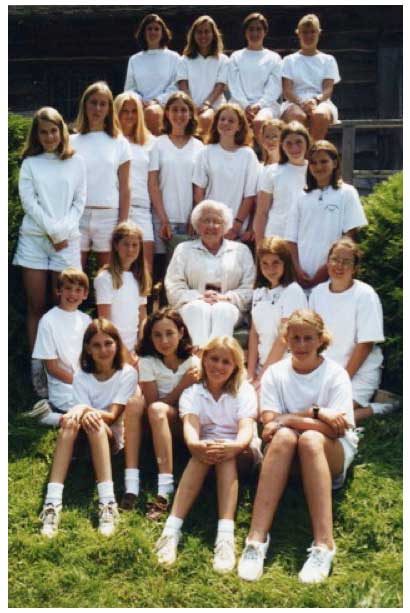
My mother, Grace McNeal, was affectionately called Mrs. Mac by generations of Four Winds campers. Here she is surrounded by some of her camp “grandchildren” – girls (and one boy – our son Ben on the left in the second row!) whose mothers and/or aunts were Four Winds campers before them.
Sadly and with much heartache we closed Four Winds in 2002 after 57 years of operation. However, there remains a vast network of alumnae numbering in the thousands from all over the world who are in touch with each other and with us who keep the Four Winds spirit alive.
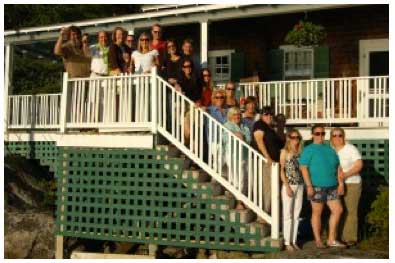
A group of Four Winds alumnae(i) who came back to Kill Kare for a reunion with families and friends.
Kill Kare has been part of the Walker Pond landscape for almost a century and was a beloved part of the Four Winds experience. Girls would water ski, canoe, swim, sail and hike by on a daily basis. There were staff dinners, reunions and parties hosted on the porch every summer. Our family has celebrated engagements, marriages, births and birthdays. We have mourned lost loved ones. We have relished our friendships and special times within the walls of this home for almost a century.
So it is with our warmest best wishes that we welcome you to Kill Kare. Sit back and relax. Take a deep breath of fresh Maine air. Let the gentle lap of the waves on the rocks lull you into a state of complete serenity. May you find our home the haven on the lake that it has been for us and may you truly “kill all your cares” while you are here. Please enjoy.
Cathy and Dan Larson

